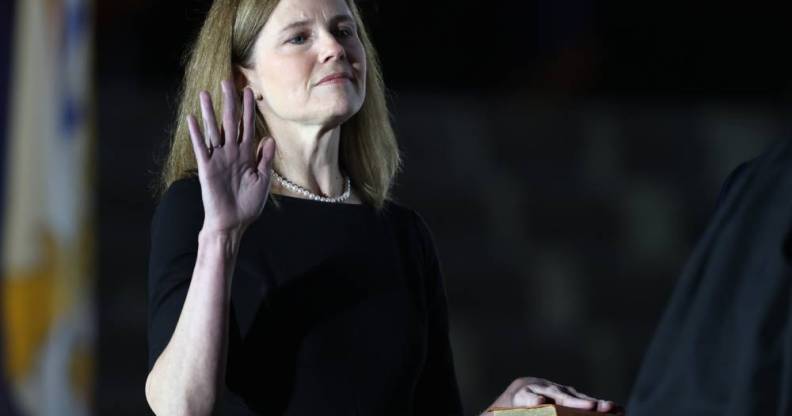Supreme Court will ‘clearly’ put ‘religious freedom’ above LGBT+ rights and overturn key ruling, law professor warns

US Supreme Court Associate Justice Amy Coney Barrett is sworn in by Supreme Court Associate Justice Clarence Thomas during a ceremonial swearing-in event on the South Lawn of the White House 26 October 2020 in Washington, DC. (Photo by Tasos Katopodis/Getty Images)
A legal expert has warned that the influx of Supreme Court cases siding with religious institutions could spell bad news for LGBT+ rights in the US.
Douglas Laycock, a professor of law at the University of Virginia and leading expert on religious liberty, warned that the current makeup of the Supreme Court means it’s unlikely that upcoming cases will side in favour of LGBT+ rights.
Since November, the Supreme Court has sided with religious institutions on cases that involved COVID regulations limiting the number of worshipers who can attend services.
Based on the way Supreme Court judges have been voting, Laycock warned religious groups may have momentum on their side.
The case at the heart of the matter involves the city of Philadelphia’s decision to stop referring children in need of foster care to Catholic Social Services, after discovering that it would not place children with same-sex couples. The case – Fulton v Philadelphia – hinges on if a government contractor like the Catholic foster care agency can object to anti-discrimination requirements.
The foster care agency argues it can prohibit LGBT+ discrimination since it will not screen same-sex couples to be foster parents because it opposes equal marriage on religious grounds.
Laycock told USA Today the voting lineup (6-3 conservative) “makes clear that Fulton is going to be reversed”.
He said: “At least five, and maybe all six, of the Conservatives will protect the Catholic Church from having to place children with same-sex couples or else losing its foster-care mission entirely.”
The court heard oral arguments in November 2020, and was the first major dispute to come before conservative Trump nominee Amy Coney Barrett, who succeeded Ruth Bader Ginsberg.
Before she was appointed, lawyers warned that Barrett’s anti-LGBT+ stance could begin to strip away rights for gay Americans. Currey Cook, a lawyer with Lambda Legal, previously told NBC News that Barrett’s “history and prior statements” about religious exemptions are “alarming” and have led him to conclude that Barrett would “be inclined to grant certain groups special permission because of their faith”.
In a statement, Rachel Laser, CEO of Americans United for Separation of Church and State, called Barrett’s record on voting in favour of religious organisations “deeply problematic”.
“She had shown that she would allow claims of religious freedom to be misused to harm women, LGBTQ people, religious minorities and the nonreligious, among many others,” Laser said.
Barrett, who is 48-years-old, is likely to serve as a justice for decades.

